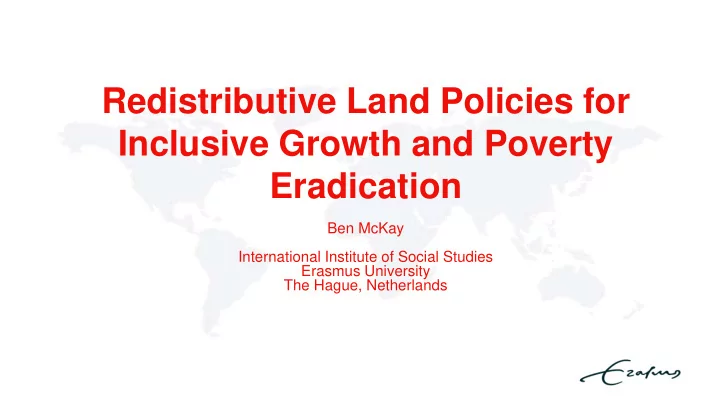

Redistributive Land Policies for Inclusive Growth and Poverty Eradication Ben McKay International Institute of Social Studies Erasmus University The Hague, Netherlands
Comprehensive land policies • Redistributive land policies • One component of a broader set of comprehensive land policies needed for inclusive growth and poverty eradication • Democratic land control • The need to protect existing tenure rights for the poor • The need to promote equitable and democratic redistributive reforms • The need to restore tenure rights to those who have been displaced • Principal forms of exclusion • Socio- economic or ‘productive’ exclusion • Gender exclusion • Generational exclusion • Ethnic exclusion
Socio- economic or ‘productive exclusion • Rural poor excluded due to the very nature of their impoverishment • Cannot afford land, lack of credit access, no capital for investments, etc. • Access to land, but not to productive resources • Excluded from putting land into production • Enter into contract relations of debt and dependency • Land policies aimed to eradicate poverty must have a pro-poor bias to ensure the poor have access and effective control over land and production
Gender-based exclusion • Dual-headed household system • Unpaid domestic labour unrecognized in formal economy • Child care, meal preparation, elderly care, other household tasks • Highly mechanized Industrial agriculture excludes women from production • Land policy must pro-actively target these gender injustices
Generational-based exclusion • Rural youth excluded from access to land • Mechanized agriculture has decreased the need to labour, often leaving the excluded without alternative employment opportunities elsewhere • “Will young men and women still have the option, and the necessary support, to engage in environmentally sound, small-scale, mixed farming, providing food and other needs for themselves, their own society and others in distant places? Or will they face only the choice to become poorly paid wage workers or contract farmers, in an endless landscape of monocrop food or fuel feedstock plantations, on land which used to belong to their parents, or to move to an uncertain existence in the informal sector of already crowded cities ?” (White 2012, 16). • Land policies must recognize and address the need of the rural youth and the future of family farming
Ethnic-based exclusion • Despite protections (ILO 169) indigenous peoples still disproportionally marginalized • Indigenous territories usually rich in natural resources and therefore targeted for extractivist projects • Recognition of the social, cultural and spiritual value of land
Democratic land control • Protecting existing land rights • Colombia’s 1.37 million indigenous live in ‘structural poverty’ and 7 out of 10 children suffer from undernourishment (HCHR 2014) • Bolivia: a record number autonomous Native Community Land (TCO) have been recognized, yet new legislation opens these same areas up for hydrocarbon extraction • Mozambique: state-led concessions for large-scale agro-industrial plantations is displacing small scale farmers from their existing land access
Democratic land control • Promote equitable and democratic redistributive reforms • Agrarian reform must not only transfer the land title but the effective access and control over land and productive resources • Recognize power imbalances between rich and poor in landed relations • Colombia: market-led land reform 1994 • By 2012, the gini for land distribution increased to 0.885 (igac 2012) • Bolivia’s ’agrarian revolution’ = tenure reform, not land reform, solidifying the pre -existing land-based wealth inequalities.
Democratic land control • Restoring land rights to the displaced • Colombia: almost 6 million people displaced from 1985-2013 • 8.3 million hectares changed hands illegally • 2012 Victims’ and Land Restitution Law • As of 2015, 90% of applicants were rejected their right to restitution
Making rights real: accountability mechanisms and human right • For those who depend on land and other natural resources for their subsistence, being deprived of access to land restricts their ability to achieve their right to food and housing (Kothari, 2007; de Schutter, 2010). --- Former UN Special Rapporteur on the Right to Food, Olivier de Schutter and the Former UN Special Rapporteur on the Right to Housing, Miloon Kothari • Declaration on the rights of peasants (in process) • Human right to land provides more opportunities for accountability • FAO-CFS Voluntary Guidelines on the Responsible Governance of Tenure of Land, Fisheries and Forests
Recommend
More recommend